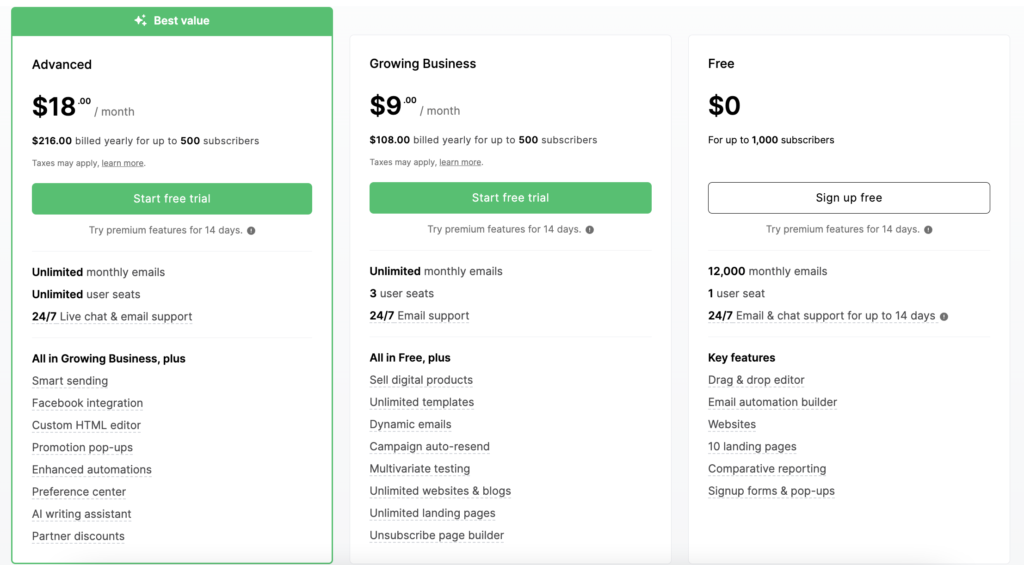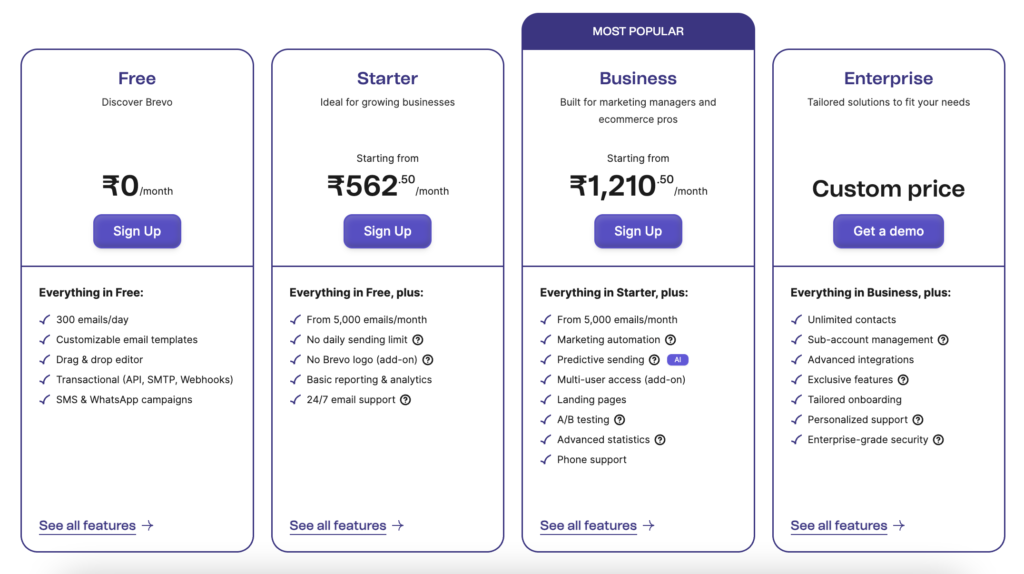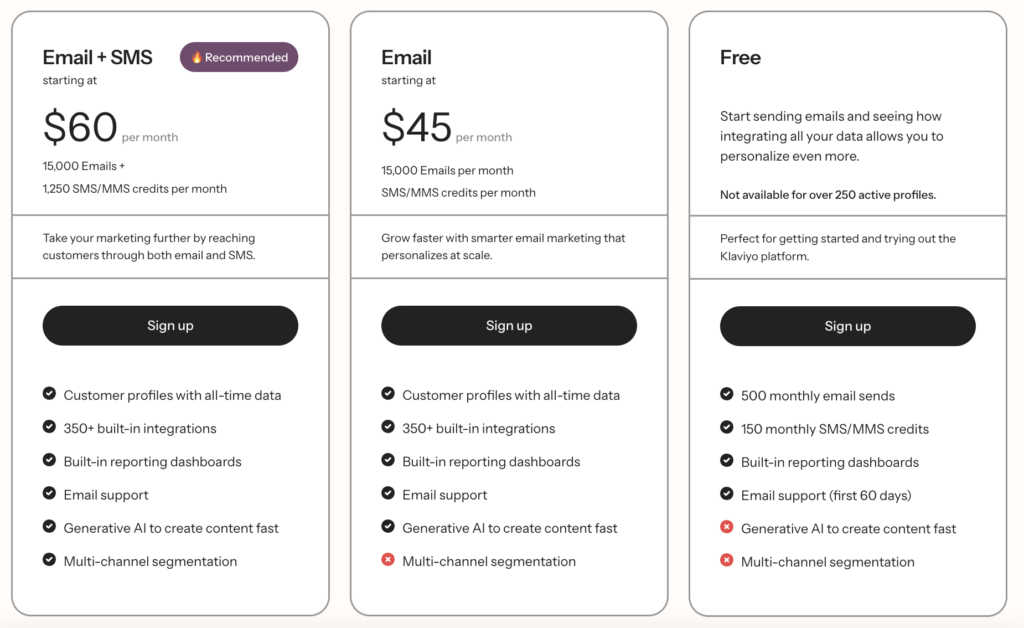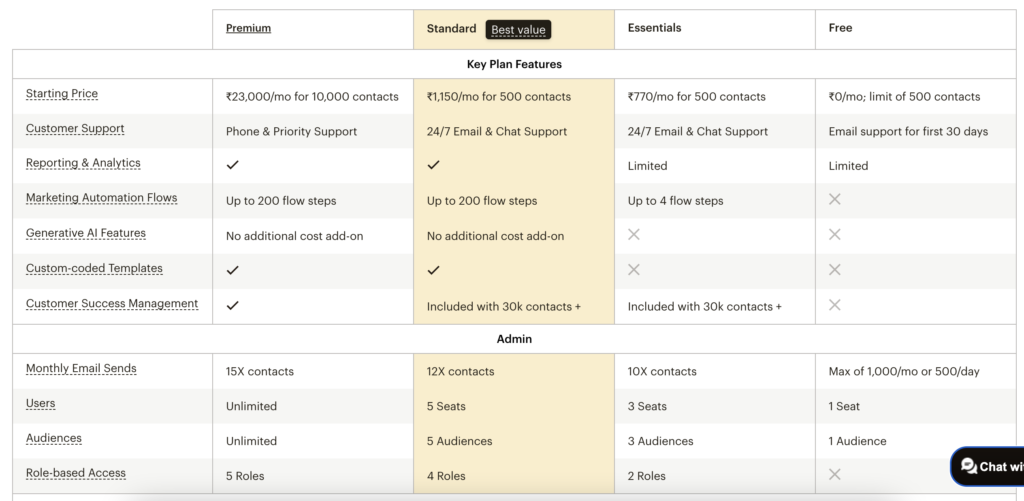Best Email Marketing Tools
Looking to grow your audience and boost engagement? Email marketing tools make it easy to create, automate, and track campaigns that connect with your customers. In this list, we’ve rounded up 10 powerful email marketing platforms with unique features to suit different business needs, whether you’re just starting out or scaling fast.

(2,356 User Ratings)
Kit: Known for its simplicity and automation built for creators, Kit is ideal for those who want to build and nurture an engaged audience. With intuitive workflows, tag-based segmentation, and strong landing page features, Kit helps turn subscribers into loyal customers without overwhelming complexity.

(2,356 User Ratings)
MailerLite offers a clean, beginner-friendly interface with powerful features like automation, landing pages, and surveys. Its standout feature is affordability without sacrificing performance. For those seeking simplicity, modern design tools, and great value, MailerLite is a top choice.

(2,356 User Ratings)
Brevo is built for growing businesses that need more than just email. It is an all-in-one platform that combines email, SMS, marketing automation, and CRM. Ideal for teams that want multichannel campaigns and strong contact management, Brevo balances power and ease at a competitive price.

(2,356 User Ratings)
Klaviyo is designed for ecommerce brands that crave deep data integration. Its USP is real-time customer insights and behavior-driven automation that boost sales. With native Shopify and WooCommerce integration, advanced segmentation, and predictive analytics, Klaviyo is ideal for scaling online stores.

(2,356 User Ratings)
Mailchimp is a versatile tool for marketers of all levels, offering an all-in-one platform for email, ads, and landing pages. Great for freelancers to mid-sized businesses, Mailchimp’s mix of features and free plan makes it a popular go-to.
Kit (formerly ConvertKit)
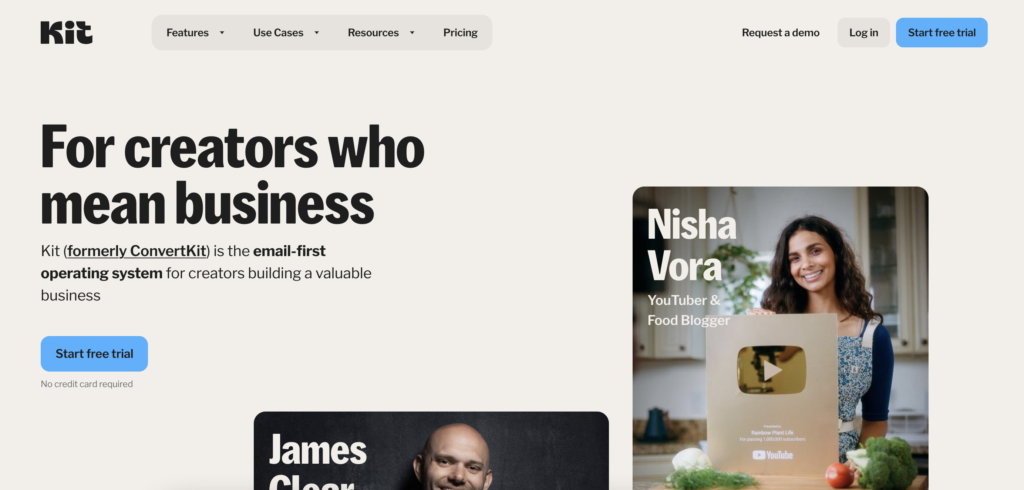
Kit is an email marketing tool designed for creators—bloggers, coaches, podcasters, and YouTubers to grow and engage their audience authentically. Its main strength lies in its clean interface, visual automation builder, and tagging system, allowing users to deliver personalized content with ease. Unlike traditional email tools, Kit focuses on storytelling, simplicity, and conversion without unnecessary complexity. It also includes basic ecommerce and paid newsletter options, making it a solid choice for monetizing content directly through emails.
Key features of Kit
Visual automation builder tailored for creators
Tag-based subscriber management instead of lists
Built-in landing pages and opt-in forms
Commerce features (sell digital products and subscriptions)
Seamless integrations with tools like Teachable, Shopify, and WordPress
Subscriber-centric reporting focused on growth and engagement
Performance Breakdown: Pros and Cons
- Clean and creator-focused UI
- Powerful automation with visual builder
- Tag-based segmentation for better personalization
- Built-in landing pages and forms
- Allows selling digital products and subscriptions directly
- Limited email design customization options
- Expensive compared to other marketing tools
- Reporting lacks depth for advanced users
- Not ideal for ecommerce-heavy businesses
Pricing Plans
MailerLite
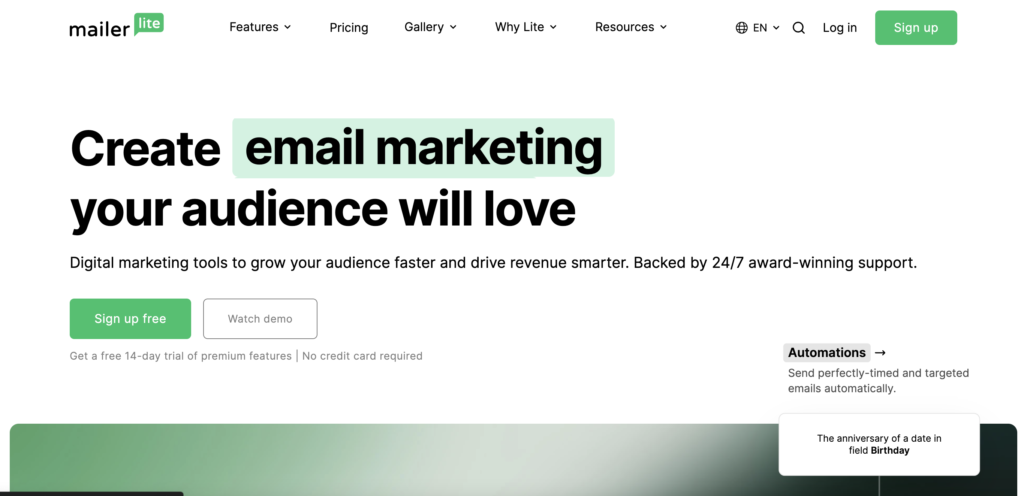
MailerLite is a user-friendly email marketing platform known for its clean interface and excellent value. It offers advanced automation, drag-and-drop editors, landing pages, and survey tools. Whether you’re a beginner or a small business with growth in mind, MailerLite delivers professional-grade email marketing at a competitive price. It combines essential features with strong usability, making it a favorite for startups and nonprofits.
Key features of MailerLite
- Drag-and-drop email editor with rich content blocks
- Automation workflows with triggers and conditions
- Built-in landing page and website builder
- Email surveys and quizzes
- Subscriber segmentation and personalization
- Affordable pricing with generous free plan
Performance Breakdown: Pros and Cons
- Intuitive drag-and-drop editor
- Excellent value for money
- Includes landing page and website builder
- Strong automation for the price point
- Clean interface ideal for beginners
- Approval process for new accounts can be strict
- Limited templates compared to others
- Advanced features require higher plans
- Customer support can be slower on free plan
Pricing Plans
Brevo (formerly Sendinblue)
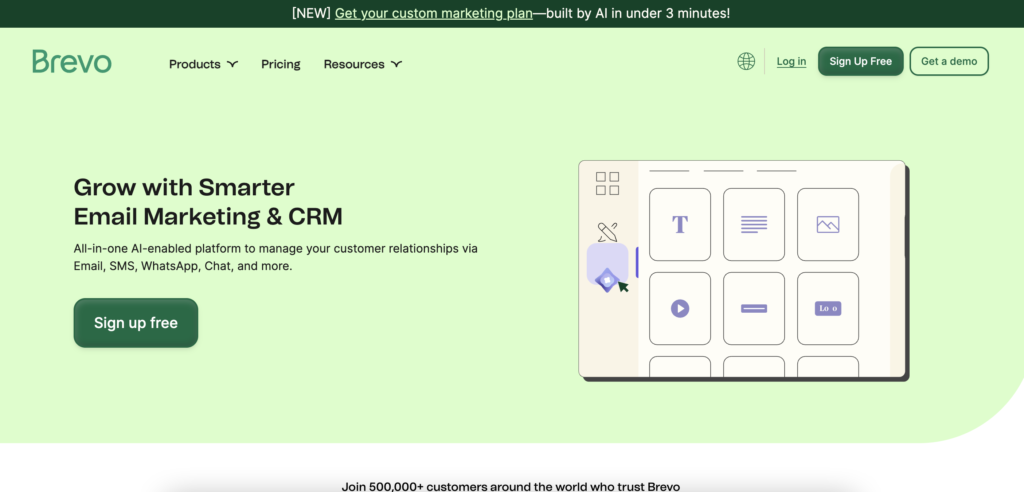
Brevo is a full-fledged communication platform designed for growing businesses. With email, SMS, WhatsApp, chat, CRM, and automation in one dashboard, Brevo helps users manage customer relationships holistically. Its biggest strength is multichannel marketing at an affordable price, with pay-as-you-go options. Whether you’re nurturing leads, sending transactional emails, or launching campaigns, Brevo offers flexibility and reach beyond inboxes.
Key features of Brevo
- Multi-channel campaigns (Whatsapp, Email) from a single platform
- Built-in CRM with contact scoring
- Drag-and-drop automation workflows
- Transactional email via SMTP/API
- Real-time chat widget for websites
Performance Breakdown: Pros and Cons
- All-in-one platform (email, SMS, CRM)
- Flexible pricing with pay-as-you-go options
- Strong automation and contact management
- Supports transactional emails via SMTP
- UI can feel clunky and outdated
- Limited template options
- Learning curve for beginners
- Deliverability can vary at times
Pricing Plans
Klaviyo
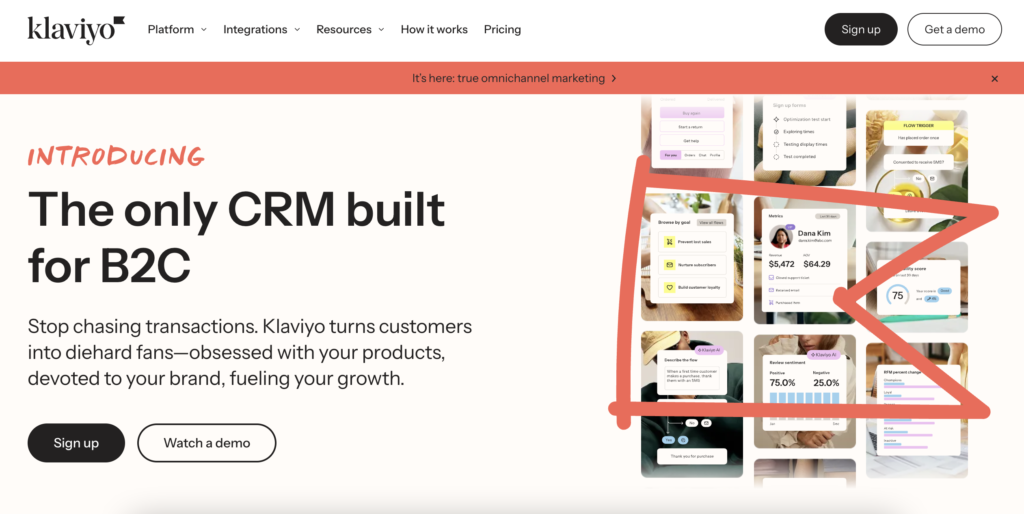
Klaviyo is a powerful email marketing platform designed specifically for ecommerce brands. It connects seamlessly with platforms like Shopify and WooCommerce to deliver behavior-driven email and SMS campaigns. With advanced segmentation, predictive analytics, and detailed reporting, Klaviyo turns customer data into action. It helps online businesses scale by delivering personalized experiences that increase conversion and retention. Its real-time data sync and ecommerce-first features set it apart from generalist platforms.
Key features of Klaviyo
- Quick integrations with Shopify, WooCommerce, and BigCommerce
- Dynamic audience segmentation based on behavior
- Predictive analytics (CLV, churn, purchase timing)
- Pre-built ecommerce automation flows (abandon cart, win-back, upsell)
- Unified dashboard for email + SMS
- A/B testing and analytics built for revenue insights
Performance Breakdown: Pros and Cons
- Shopify, WooCommerce integration
- Powerful segmentation and data-driven targeting
- Predictive analytics and purchase insights
- Strong automation with revenue-focused flows
- Real-time syncing with ecommerce platforms
- Expensive, especially for large lists
- Steeper learning curve for beginners
- Slower interface with large datasets
Pricing Plans
Mailchimp
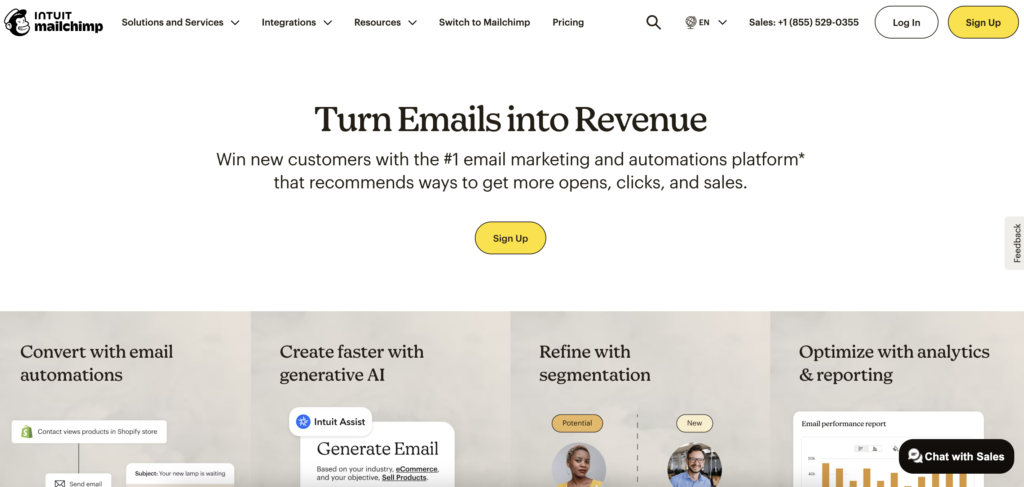
Mailchimp is one of the most popular all-in-one marketing platforms, suitable for businesses of all sizes. It combines email marketing with CRM, automation, social ads, landing pages, and AI-powered insights. Known for its ease of use and visually rich editor, Mailchimp helps users create professional campaigns with minimal learning curve. Its strong brand, wide feature set, and accessible free plan make it a go-to choice for many small to mid-sized teams.
Key features of Mailchimp
- Drag-and-drop email and landing page builder
- Customer journey builder with automation rules
- AI-generated content suggestions and design tools
- Pre-built templates for every industry
- Multichannel marketing (email, social, ads, postcards)
- Built-in audience CRM and performance analytics
Performance Breakdown: Pros and Cons
- User-friendly with drag-and-drop builder
- Robust free plan for beginners
- Multichannel marketing (email, social, ads)
- AI content tools and smart suggestions
- Extensive template library and integrations
- Pricing increases steeply with list size
- Automation and segmentation limited on lower plans
- Customer support gated behind higher tiers
Pricing Plans
On this page
How We Curated This List: To finalize this list of digital tools, we followed a structured and user-centric evaluation process. We began by shortlisting tools based on popularity, relevance across industries, and consistent user demand. Each tool was then assessed using hands-on testing and verified through authentic reviews from popular SAAS platforms like Capterra, G2, and Trustpilot. We evaluated them on key parameters such as ease of use, key features, pricing vs value, and customer support. Special attention was given to how well these tools meet the needs of different user segments including freelancers, small businesses, and growing teams. Only tools that demonstrated real-world value and a solid track record made the final cut. This list is periodically reviewed to ensure it reflects the latest updates and evolving user expectations, so readers always find relevant and high-performing options.


